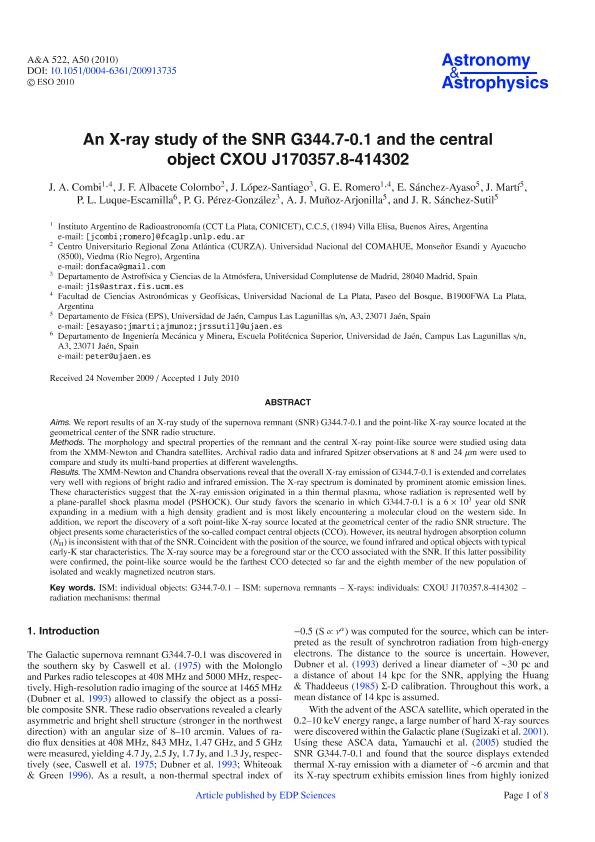Mostrar el registro sencillo del ítem
dc.contributor.author
Combi, Jorge Ariel

dc.contributor.author
Albacete Colombo, Juan Facundo

dc.contributor.author
López Santiago, J.
dc.contributor.author
Romero, Gustavo Esteban

dc.contributor.author
Sánchez Ayaso, Estrella

dc.contributor.author
Martí, J.
dc.contributor.author
Luque Escamilla, P. L.
dc.contributor.author
Pérez González, P. G.
dc.contributor.author
Muñoz Arjonilla, A. J.
dc.contributor.author
Sánchez Sutil, J. R.
dc.date.available
2017-07-05T17:04:42Z
dc.date.issued
2010-11-01
dc.identifier.citation
Combi, Jorge Ariel; Albacete Colombo, Juan Facundo; López Santiago, J.; Romero, Gustavo Esteban; Sánchez Ayaso, Estrella; et al.; An X-ray study of the SNR G344.7-0.1 and the central object CXOU J170357.8-414302; Edp Sciences; Astronomy And Astrophysics; 522; 1-11-2010; 50-57
dc.identifier.issn
0004-6361
dc.identifier.uri
http://hdl.handle.net/11336/19596
dc.description.abstract
Aims. We report results of an X-ray study of the supernova remnant (SNR) G344.7-0.1 and the point-like X-ray source located at the geometrical center of the SNR radio structure. Methods. The morphology and spectral properties of the remnant and the central X-ray point-like source were studied using data from the XMM-Newton and Chandra satellites. Archival radio data and infrared Spitzer observations at 8 and 24 μm were used to compare and study its multi-band properties at different wavelengths. Results. The XMM-Newton and Chandra observations reveal that the overall X-ray emission of G344.7-0.1 is extended and correlates very well with regions of bright radio and infrared emission. The X-ray spectrum is dominated by prominent atomic emission lines. These characteristics suggest that the X-ray emission originated in a thin thermal plasma, whose radiation is represented well by a plane-parallel shock plasma model (PSHOCK). Our study favors the scenario in which G344.7-0.1 is a 6 × 103 year old SNR expanding in a medium with a high density gradient and is most likely encountering a molecular cloud on the western side. In addition, we report the discovery of a soft point-like X-ray source located at the geometrical center of the radio SNR structure. The object presents some characteristics of the so-called compact central objects (CCO). However, its neutral hydrogen absorption column (NH) is inconsistent with that of the SNR. Coincident with the position of the source, we found infrared and optical objects with typical early-K star characteristics. The X-ray source may be a foreground star or the CCO associated with the SNR. If this latter possibility were confirmed, the point-like source would be the farthest CCO detected so far and the eighth member of the new population of isolated and weakly magnetized neutron stars.
dc.format
application/pdf
dc.language.iso
eng
dc.publisher
Edp Sciences

dc.rights
info:eu-repo/semantics/openAccess
dc.rights.uri
https://creativecommons.org/licenses/by-nc-sa/2.5/ar/
dc.subject
Ism: Individual Objects: G344.7-0.1
dc.subject
Ism: Supernova Remnants
dc.subject
X-Rays: Individuals: Cxou J170357.8-414302
dc.subject
Radiation Mechanisms: Thermal
dc.subject.classification
Astronomía

dc.subject.classification
Ciencias Físicas

dc.subject.classification
CIENCIAS NATURALES Y EXACTAS

dc.title
An X-ray study of the SNR G344.7-0.1 and the central object CXOU J170357.8-414302
dc.type
info:eu-repo/semantics/article
dc.type
info:ar-repo/semantics/artículo
dc.type
info:eu-repo/semantics/publishedVersion
dc.date.updated
2016-06-15T19:20:44Z
dc.journal.volume
522
dc.journal.pagination
50-57
dc.journal.pais
Francia

dc.journal.ciudad
Paris
dc.description.fil
Fil: Combi, Jorge Ariel. Provincia de Buenos Aires. Gobernación. Comision de Investigaciones Científicas. Instituto Argentino de Radioastronomía. Consejo Nacional de Investigaciones Científicas y Técnicas. Centro Científico Tecnológico Conicet - La Plata. Instituto Argentino de Radioastronomia; Argentina. Universidad Nacional de la Plata. Facultad de Ciencias Astronómicas y Geofísicas; Argentina
dc.description.fil
Fil: Albacete Colombo, Juan Facundo. Centro Universitario Regional Zona Atlántica, Universidad Nacional del Comahue; Argentina. Consejo Nacional de Investigaciones Científicas y Técnicas; Argentina
dc.description.fil
Fil: López Santiago, J.. Universidad Complutense de Madrid; España
dc.description.fil
Fil: Romero, Gustavo Esteban. Provincia de Buenos Aires. Gobernación. Comision de Investigaciones Científicas. Instituto Argentino de Radioastronomía. Consejo Nacional de Investigaciones Científicas y Técnicas. Centro Científico Tecnológico Conicet - La Plata. Instituto Argentino de Radioastronomia; Argentina. Universidad Nacional de la Plata. Facultad de Ciencias Astronómicas y Geofísicas; Argentina
dc.description.fil
Fil: Sánchez Ayaso, Estrella. Universidad de Jaén; España
dc.description.fil
Fil: Martí, J.. Universidad de Jaén; España
dc.description.fil
Fil: Luque Escamilla, P. L.. Universidad de Jaén; España
dc.description.fil
Fil: Pérez González, P. G.. Universidad Complutense de Madrid; España
dc.description.fil
Fil: Muñoz Arjonilla, A. J.. Universidad de Jaén; España
dc.description.fil
Fil: Sánchez Sutil, J. R.. Universidad de Jaén; España
dc.journal.title
Astronomy And Astrophysics

dc.relation.alternativeid
info:eu-repo/semantics/altIdentifier/url/http://adsabs.harvard.edu/cgi-bin/nph-data_query?bibcode=2010A%26A...522A..50C&link_type=ARTICLE&db_key=AST&high=
dc.relation.alternativeid
info:eu-repo/semantics/altIdentifier/url/https://www.aanda.org/articles/aa/abs/2010/14/aa13735-09/aa13735-09.html
dc.relation.alternativeid
info:eu-repo/semantics/altIdentifier/doi/http://dx.doi.org/10.1051/0004-6361/200913735
dc.relation.alternativeid
info:eu-repo/semantics/altIdentifier/url/https://arxiv.org/abs/1007.5146
Archivos asociados
